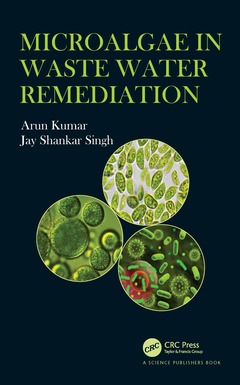Microalgae in Waste Water Remediation

Microalgae in Waste Water Remediation aims to point out trends and current topics concerning the use of microalgae in wastewater treatment and to identify potential paths for future research regarding microalgaebased bioremediation. To achieve this goal, the book also assessing and analyzes the topics that attract attention among the scientific community and their evolution through time. This book will be useful to the students, scientists and policy makers concerned with the microalgae mediated management of wastewater effluents and its applications in overall future sustainable development.
Microalgae I: Origin, Distribution and Morphology. Microalgae II: Cell Structure, Nutrition and Metabolism. Microalgae III: Stress Response and Wastewater Remediation. Municipal Wastewater. Petroleum Wastewater. Distillery and Sugar Mill Wastewater. Tannery Wastewater. Pulp and Paper Wastewater. Textile Wastewater. Food Processing Wastewater. Integrated Microalgal Wastewater Remediation and Microalgae Cultivation. Microalgal Biomass: An Opportunity for Sustainable Industrial Production.
Dr. Arun Kumar is currently working in the field of Microalgal ecology and their applications in bioremediation and sustainable environment. Dr. Kumar has published various research and review papers in reputed journals like Frontier in Microbiology, Frontiers in Biosciences (Landmark) and Environment and Sustainability Indicators (Elsevier); in the area of microalgal bioremediation, biofuels and bioproducts production from microalgae. He obtained his doctoral degree in Environmental Microbiology from Babasaheb Bhimrao Ambedkar University, Lucknow, India. In his doctoral work, Dr. Kumar successfully metabolized a widely used and hazardous insecticide Chlorpyrifos by cyanobacterial strain Oscillatoria sp. CYA8 CPF isolated from paddy fields; which could be useful to decontaminate the pesticide residue from paddy fields and also provide a means to fix the atmospheric nitrogen.
Dr. Jay Shankar Singh is faculty member at Department of Environmental Microbiology, Babasaheb Bhimrao Ambedkar University, India. Dr. Singh has contributed significantly to the subject of land uses, restoration ecology and natural resource management. He is acquainted with the area of natural resource management and demonstrated that application of beneficial microbes, pyrite, coal fly ash (FA), crop residues based farm yard manure (FYM) and rice husk biochar (RHB) amendments in enhancement of paddy crop productivity, green house gas CH4 mitigation and restoration of degraded soil. Dr. Singh has published his research outputs in international journals (Trends in Biotechnology, Agriculture Ecosystem and Environment, Frontiers, Journal of Environmental Management, etc.) with high impact factors and good citations on Scopus, Google Scholar (Total citation as on December 10, 2020=>3968; h-index=32; i10 index=64) and other scientific databases. He is also actively serving as member of various scientific committees, holding editorial respon
Date de parution : 07-2023
15.6x23.4 cm
Date de parution : 07-2021
15.6x23.4 cm
Thèmes de Microalgae in Waste Water Remediation :
Mots-clés :
Microalgal Biomass; Waste water remediation; Microalgal Species; Microalgae mediated management; Microalgal Cells; Municipal wastewater treatment; Microalgal Biofilms; Sustainable development; Asp; Cod Reduction; Cod Level; High Cod; Dissolved Air Flotation; Energy Source; Tannery Wastewater; Microalgal Strains; Chlorella Vulgaris; High Bod; PS II; Textile Wastewater; Food Processing Wastewater; Distillery Wastewater; Paper Wastewater; Petroleum Wastewater; Adsorbable Organic Halides; Municipal Wastewater; Galdieria Sulphuraria; Eukaryotic Microalgae; Endosymbiotic Event



